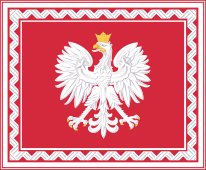August Zaleski
| August Zaleski | |
|---|---|
 | |
| President of the Republic of Poland 2nd President of Poland in Exile | |
|
In office June 9, 1947 – April 7, 1972 | |
| Prime Minister | Tadeusz Bór-Komorowski, Tadeusz Tomaszewski, Roman Odzierzyński, Jerzy Hryniewski, Stanisław Cat-Mackiewicz, Hugon Hanke, Antoni Pająk, Aleksander Zawisza, Zygmunt Muchniewski |
| Preceded by | Władysław Raczkiewicz |
| Succeeded by | Stanisław Ostrowski |
| Personal details | |
| Born |
September 13, 1883 Warsaw, Russian Empire |
| Died |
April 7, 1972 (aged 88) London, England |
| Nationality | Polish |
| Political party | None |
August Zaleski (September 13, 1883 – April 7, 1972) was a Polish economist, politician, and diplomat. Twice Minister of Foreign Affairs of the Republic of Poland, he served as the President of Poland within the Polish Government in Exile.
Biography
August Zaleski was born in Warsaw on September 13, 1883. In 1901, he was graduated from a gymnasium in Praga and became a librarian for the Krasiński family, but finally moved to London, where he received a master's degree from the London School of Economics. He was unable to return to Poland during World War I and, in 1917, started lecturing in the Polish language in London. About that time he also became interested in freemasonry and became one of the collaborators of the Polish National Committee, the institution that was to become the Polish representative to the Triple Entente. As such, he was one of Roman Dmowski's envoys to assure English politicians that Józef Piłsudski's Polish Legions had sided with the Central Powers in order to combat Russia, not the West.
In 1918, when Poland regained her independence, Zaleski proved to be a skilled diplomat and served at various posts in Polish embassies in Switzerland, Greece, Italy and was one of the Polish envoys to the League of Nations. After the May Coup d'État of 1926 he sided with the camp of Marshal Józef Piłsudski and, until 1932, held the post of minister of foreign affairs in two subsequent governments. Between 1928 and 1935, Zaleski was also a member of the Senate of Poland. At the end of his term, he retired from active politics and became chairman of Bank Handlowy (Commercial Bank), one of the best-known Polish banks of the time. He held that post until the invasion of Poland (1939), when he successfully evacuated his company's assets first to France and then the United Kingdom.
In exile, August Zaleski yet again became minister of foreign affairs, this time in the government of General Władysław Sikorski. In June 1947, Zaleski was nominated president of Polish government in exile. Initially supported by much of the Polish diaspora (Polonia), he nominated General Tadeusz Bór-Komorowski to be prime minister. However, by the end of his seven-year term, Zaleski was facing opposition and was at odds with much of the political elite. His response was to extend his term and nominate Stanisław Cat-Mackiewicz to be prime minister. Many Poles in exile (Bór-Komorowski and Władysław Anders amongst them) considered this unlawful and therefore created the Council of the Three, a collective head of state that was to take over the role of the president of Poland until Zaleski properly resigned his post. However, in fact for almost twenty years the Council and Zaleski claimed the position simultaneously.
August Zaleski died on April 7, 1972, in London. Among his papers, two conflicting nominations of his successor were found: one naming Stanisław Ostrowski and the other one, perhaps forged, naming Juliusz Nowina-Sokolnicki. The Council of the Three accepted the former and disbanded.
References
External links
Further reading
- August Zaleski: Minister Spraw Zagranicznych RP 1926–1932 w Swietle Wspomnien i Dokumentow by Piotr Wandycz, reviewed by Anna M. Cienciala in Slavic Review, Vol. 40, No. 3 (Autumn, 1981), pp. 492–493
| Political offices | ||
|---|---|---|
| Preceded by Władysław Raczkiewicz |
President of the Polish Republic in exile 1947–1972 |
Succeeded by Stanisław Ostrowski |
